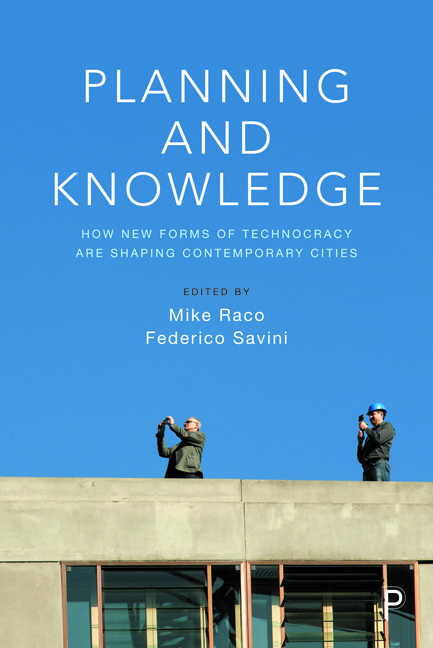Book contents
- Frontmatter
- Contents
- List of figures
- List of tables
- Notes on contributors
- Part I Conceptual framings of technocracy
- Part II Public planning and bureaucracies in contemporary urban development politics
- Part III Corporate knowledge and the land and property development sector
- Part IV Private consultants and the delivery of public policy
- Part V New constellations of actors and the management and governance of contemporary cities
- References
- Index
9 - Finance as technocratic agent in urbandevelopment
Published online by Cambridge University Press: 30 April 2022
- Frontmatter
- Contents
- List of figures
- List of tables
- Notes on contributors
- Part I Conceptual framings of technocracy
- Part II Public planning and bureaucracies in contemporary urban development politics
- Part III Corporate knowledge and the land and property development sector
- Part IV Private consultants and the delivery of public policy
- Part V New constellations of actors and the management and governance of contemporary cities
- References
- Index
Summary
Introduction
Current city rankings, cities’ global advertisingcampaigns and large-scale urban development dynamicswith iconic ‘trophy’ buildings, among others,suggest a somewhat schizophrenic trend incontemporary urban development. Cities take muchpride in scoring high as the globe's most affluentplaces. Yet, they pay a high price for doing so byconceding to the powers of a planning ‘technocracy’,whose activities often intensify the inequalities ofliving conditions and the unaffordability ofhousing, to name but a few. This chapter exploresthe impact of a specific type of economic elite thatshould be included in the equation of technocracy oncontemporary urban planning: the financial andadvanced business services (FABS) such as legal,tax, property and other advisory firms – the‘technicians’ who keep the financial capitalistsystem afloat. My argument is that this diverselandscape of private experts is becomingincreasingly influential in shaping public planningpolicies and private corporate strategies in realestate development, yet they operate asunaccountable actors, far from any transparentdemocratic process. The role of the FABS industry ischaracterised by this sector's ability to generatepower and strategic knowledge that determines urbanand regional development. I develop and exemplify myargument in the context of Luxembourg and its vastlydynamic financial economy. Like in the UK, financeis one of Luxembourg's strategic industries.Although Luxembourg's financial centre is tightlyembedded in Luxembourg City's urban fabrics, it isalso largely disarticulated from it and forms partof a global archipelago with other financialcentres. Specifically since the early 2000s,Luxembourg City has been responding to the demandsof the international FABS elite in its provision ofeconomic policies and large-scale urban developmentprojects (Dörry, 2015). I therefore situate FABS astechnocratic agent at the interface of financialeconomic policy and urban development.
Today, the world's major urban economies offerextensive opportunities to firms and investors, andthe imperative of financial capitalism has boostedthe significance of firms operating in the FABSeconomy. Such firms flock to places with favourableregulations, sophisticated interconnectivities andurban vivaciousness to fully grasp the vastopportunities offered, for example, in global citiesand international financial centres (IFCs).
- Type
- Chapter
- Information
- Planning and KnowledgeHow New Forms of Technocracy Are Shaping Contemporary Cities, pp. 115 - 126Publisher: Bristol University PressPrint publication year: 2019



